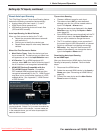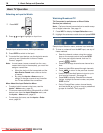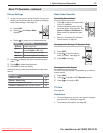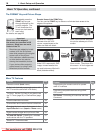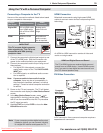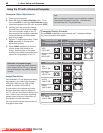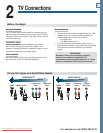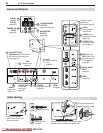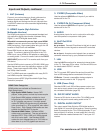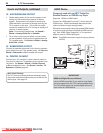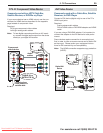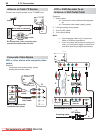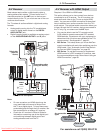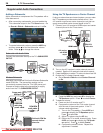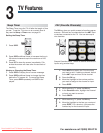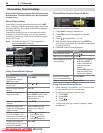
2. TV Connections 23
For assistance call 1(800) 332-2119
Inputs and Outputs, continued
1. ANT (Antenna)
Connect your main antenna or direct cable service
(without a cable box) to
ANT
. The
ANT
input can
receive digital and analog over-the-air channels from
a VHF/UHF antenna or non-scrambled digital/analog
cable source.
2. HDMI
®
Inputs
(High-Definition
Multimedia Interface)
The HDMI inputs support uncompressed standard and
high-definition digital video formats, bitstream Dolby
Digital 5.1, and PCM digital stereo audio.
Mitsubishi recommends you use high-speed HDMI
cables to connect newer source devices incorporating
HDMI technology. High-speed cables bring you the full
benefits of Deep Color and x.v.Color.
These HDMI inputs can also accept digital DVI video
signals. To connect a device’s DVI output to the TV’s
HDMI input, use an HDMI-to-DVI adapter or cable plus
an analog audio. Connect the audio cable to the
DVI/PC
AUDIO INPUT
jack on the TV to receive audio from your
DVI device.
Use the HDMI inputs to connect to CEA-861 HDMI com-
pliant devices such as a high-definition receiver or DVD
player. These inputs support 480i, 480p, 720p, 1080i,
and 1080p video formats.
The TV’s HDMI inputs are compatible with many DVI-D
and HDMI computer video signals.
These inputs are HDCP (High-Bandwidth Digital Copy
Protection) compliant.
3. Y/
VIDEO
(Composite Video)
Use the adjacent
AUDIO R
and
L
inputs if you wish to
send audio to the TV.
4. Y/VIDEO Pb Pr (Component Video)
Use the adjacent
AUDIO R
and
L
jacks if you wish to
send audio to the TV.
5. AUDIO
Analog stereo inputs for use in conjunction with adja-
cent composite or component video jacks.
6. NetC Out/IR IN
265 Series
As an output: Connect IR emitters to this jack to send
NetCommand control signals to external IR-controlled
devices.
As an input: Accepts control signals from an external
controller when set up by your professional installer.
7. LAN
Use the
LAN
Ethernet jack for streaming internet video
to the TV. See page 42 for setup. Visit www.VUDU.com
for details about VUDU
™
service.
8. USB
The TV can read JPEG photo files and mp3 music files
from a USB storage device connected to this input.
154 Series. Connect a compatible wireless adapter to
stream internet content to the TV
(page 42)
.
9. USB (Power Only)
Standard USB 5-volt, 500-milliamp power output you
can use to supply power to an accessory device, such
as a wireless subwoofer (page 28).
10. DVI/PC INPUT AUDIO
Connect a DVI device to one of the TV’s HDMI inputs
and use this jack to send analog audio to the TV.
11. DIGITAL AUDIO OUTPUT
This output sends Dolby Digital or PCM digital audio to
your digital A/V surround sound receiver. Incoming analog
audio is converted by the TV to PCM digital audio. If you
have a digital A/V receiver, in most cases this is the only
audio connection needed between the TV and your A/V
receiver.
HDMI Cable Categories
HDMI cables are available as Standard and
High-Speed types.
High-Speed HDMI Cables.• Newer DVD
players, video games, and set-top boxes require
High-Speed HDMI cables, suitable for clock
frequencies up to 340 MHz or data rates of up
to 10.2 gigabits per second. Use high-speed
cables for 1080p HD signals carrying extended
color encodings (i.e., 30 or more bits, also called
Deep Color). High-Speed HDMI cables are also
suitable for standard HDTV signals.
Standard HDMI Cables• . Standard HDMI
cables may be unmarked. They are suitable for
standard HDTV 720p, 1080i, and 1080p signals
with 8-bit color depth. Use Standard HDMI
cables for clock frequencies up to 74.25 MHz or
data rates of up to 2.23 gigabits per second.
Downloaded From TV-Manual.com Manuals



